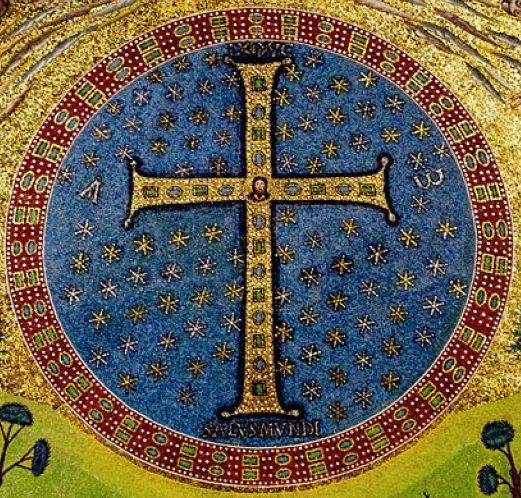EVENTS 11:30–13:00. Arrival of the pilgrims to the monastery and their placement in the guest-house (ἀρχονταρίκι). 07:30–14:00. Working hours of the icon shop. 12:30. Veneration of the sacred things of the monastery. Pilgrims wishing to venerate are met at the monastery gates by the gatekeeper. EVENING SERVICE. 16:00. 9th hour → Vespers → Moleben or… Continue reading A daily timetable from the Monastery of St. Panteleimon on Mount Athos.
The Canon of the Cross, by Joseph the Hymnographer.
The Canon of the Cross, of which the Acrostic is:We all praise the Tree that should be worshipped. A Composition by Joseph the Hymnographer. Tone 8. Ode 1. The wonderworking rod of Moses. Let us today with pure mind and devout intent worship the life-bearing Cross of the Lord; for it is set forth granting… Continue reading The Canon of the Cross, by Joseph the Hymnographer.
St Gregory Palamas, The 150 Chapters, chapter 87.
Going forward, this great man [i.e. St Dionysius the Areopagite] hymns such processions and energies of God in other God-fitting names and calls them participations and participations-as-such (μετοχαὶ καὶ αὐτομετοχαὶ); and in many places of his discourses he shows also that they are above beings and that they are paradigms of beings, pre-subsisting in God… Continue reading St Gregory Palamas, The 150 Chapters, chapter 87.
St Symeon the New Theologian. Third Theological Discourse.
That if the Father is one thing, then so too is the Son; and if the Son is such, then so too is the Spirit. That the three are one Spirit of the same glory, essence, and throne. God is always one. He is always called the one God. We name him as such in… Continue reading St Symeon the New Theologian. Third Theological Discourse.
St Symeon the New Theologian. Second Theological Discourse.
Against Those Who Try To Theologize Without The Spirit. The man who has received from above the grace of having the praise of God always on his lips opens his mouth to breathe the Spirit of life, and strives to open it yet wider to welcome the word of life more abundantly. This is that… Continue reading St Symeon the New Theologian. Second Theological Discourse.
St Symeon the New Theologian, First Theological Discourse.
Against Those Who Ascribe The Concept Of Anteriority To The Father. It would be the sign of a rash and presumptuous soul to speak or discourse about God, to investigate all that concerns him, or to try to express what cannot be expressed, or understand what for all men is beyond understanding. This is not… Continue reading St Symeon the New Theologian, First Theological Discourse.
St Maximus the Confessor, 1st Century on Theology, 48–50.
48. One should seek from those who are serious what it is that one ought to understand to be the works which God began at the beginning of the world, and what are the works which he did not begin at the beginning of the world. For whilst God ceased from all the works which… Continue reading St Maximus the Confessor, 1st Century on Theology, 48–50.
Christos Giannaras on the Declaratory and Rational Character of the Logos
The first meaning of «λόγος» necessarily comes forth from «λέγω», that is, collection, assembly, gathering. We read in Homer: “let us collect (λέγωμεν) the bones of Patroklos Menoitios” [1]. Originally, «λέγω» meant I collect, I gather the partial elements or categorisations into the unity which is indispensable for the manifestation of the existent. Crucially, to this original signification… Continue reading Christos Giannaras on the Declaratory and Rational Character of the Logos
St Maximus the Confessor, Ambiguum 22
A perfect account of God is difficult to attain. For there are many objections to be faced, and the solutions to these objections are hard to elaborate. (St Gregory of Nazianzus, Oration 28.21.) It is not possible for things to be many without differing from one another. So if the things that have come to be… Continue reading St Maximus the Confessor, Ambiguum 22
Jean-Claude Larchet on Essence, Energies, and Logoi in St Maximus the Confessor
1. The Divine Essence and Energies. God is capable of being known indirectly in the contemplation of the logoi of the creation which manifest him. But God can also be known directly – according to a superior mode passing beyond all cognition but without accessing the essence – by the faithful, who are elevated to… Continue reading Jean-Claude Larchet on Essence, Energies, and Logoi in St Maximus the Confessor

